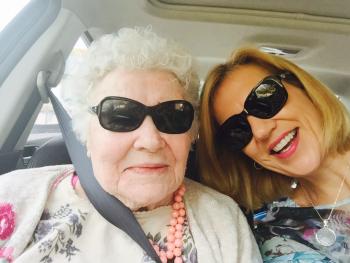How LIVING in My Today Helps Mother and Daughter Connect
By Kristian Partington
Karen Young remembers how afraid her mother Sigrid was back in September as they left her home at The Village of Wentworth Heights for a trip to a dentist’s office. It wasn’t the dentist that caused the immediate fear, but the act of driving itself: for Sigrid, who is living with dementia, it was as though this was her first time travelling along a busy highway.

Sigrid Preuss from Wentworth Heights with her daughter, Karen.
Karen knew what to do, however. She possessed strategies to handle such moments, thanks in large part to all she’s learned this past year through the LIVING in My Today dementia education program offered through Schlegel Villages. Karen slipped a CD into the stereo and quiet German music began to play. She asked her mother to close her eyes. “Imagine you are dancing,” she suggested, and as the music played and the car wound down the highway, the fear eventually subsided.
Dementia has altered Sigrid’s reality and her reactions to the world around her can be unpredictable, at times, if nothing else. The thought of venturing out with her mother unaided made Karen nervous, to be sure, but a year ago the prospect would have terrified her so much that it would never have happened.
This trip back in September was surprisingly smooth, Karen says, because of all she learned this past year.
“I finally took a deep breath and said to myself, follow through on what I have learned from the courses I attended,” Karen says. “I did, and the afternoon went so smooth I felt as if my mom and I went back in time.”
Karen is the type of person who craves knowledge, especially when it comes to understanding the changes that are occurring within the life of a loved one. When the word dementia entered her life, “I wanted to know as much as I could so that I could work with her along her journey,” she says. “Honest to God, if I hadn’t taken those courses, I don’t think I could’ve taken her to the dental office that day.”
Just like that day in the car, Karen is able to draw upon strategies every day to help her make the most of the time she shares with her mother. She slows down and talks with her mother to help her get to a more relaxed state of mind when she expresses herself with agitation. Instead of minimizing her mother’s reactions, she understands them as valid in that moment, and this is the goal of the LIVING in My Today philosophy.
The trip to the dentist is but one example of how this philosophy has reshaped Karen’s understanding of dementia and continues to influence the way her relationship with Sigrid evolves. She insists that everyone who is touched by dementia should be exposed to the program, she says, because she often sees other family members in the village who feel compelled to apologize for the actions of their loved ones. “You shouldn’t be apologizing for them just being them,” Karen says.
Sigrid’s perception of the world around her has changed and continues to do so, and in some ways, Karen mourns for the loss of the mother she knew before, but being present in each moment when they are together, and taking each moment as it comes, makes their time together special.
“It’s amazing to see the journey through her eyes and see how she’s becoming so receptive and so appreciative of the smallest things,” Karen says, admitting to the sadness she feels knowing that she is no longer recognized as her mother’s daughter. “I know I belong to you,” Karen recalls her mother saying one day, and sometimes that sense of belonging is enough.
“As long as she feels I’m connected to her, that’s all that matters,” Karen says. Before gaining a new understanding through LIVING in My Today, however, she may not have felt the same sense of peace with today’s reality.
- Previous
- View All News
- Next


















































































































































































































































































































































































































































































































































